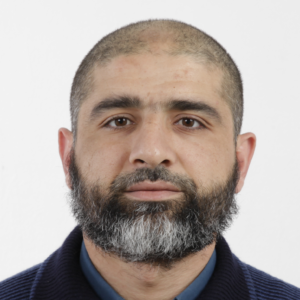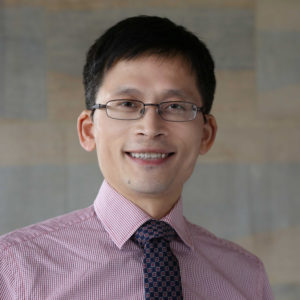W3: B5G/6G support for space/air/ground/marine/submarine cooperative, connected, and autonomous vehicles
Co-chair: Faouzi Bouali, Coventry University, UK
Co-chair: Zilong Liu, University of Essex, UK
Co-chair: Haeyoung Lee, University of Surrey, UK
Keynote Speaker: Prof. Mohamed-Slim Alouini
Keynote Speaker: Dr. Giovanni Geraci
Abstract: Recently, the study of cooperative, connected, and autonomous vehicles (CCAVs) has attracted tremendous research attention from both academia and industry, with a major aim for delivering a “society in motion” featured with unprecedented travel experience and significantly enhanced traffic efficiency and safety. The potential of the fifth generation (5G) of mobile networks to support CCAVs is evident from numerous seminal studies and field trials. From an initial interest in the ground segment to a new trend in exploring other domains (e.g., space and air), it is believed that CCAVs are pivotal for the enabling of ubiquitous, seamless, and scalable mobility. In this context, the aim of this workshop is to assess the capabilities of beyond 5G (B5G) and sixth generation (6G) mobile networks to support CCAVs across all possible (i.e., space, air, ground, marine and submarine) segments. First, the workshop will identify the gaps in the existing 5G solutions for supporting the cooperation, connectivity, and autonomy elements of CCAVs. Second, the workshop will disseminate the latest findings and solutions assessing the capabilities of future B5G/6G networks in filling those gaps arising from a variety of CCAV use cases. Third, the workshop will analyse and discuss pressing challenges and future trends in the development, testing and deployment of CCAVs from various perspectives, including new algorithms, metrics, tools, and materials.
The topics of interest include, but are not limited to:
- B5G/6G integration of space, air, ground, marine, submarine domains for ubiquitous, seamless, and scalable mobility;
- B5G/6G satellites (i.e., VLEO, LEO, MEO and GEO) support for CCAVs;
- B5G/6G high altitude platforms (HAPs) support for CCAVs;
- B5G/6G unmanned aerial vehicles (aka drones) support for CCAVs;
- B5G/6G integration of terrestrial and non-terrestrial networks (NTN) for CCAVs;
- B5G/6G combined communications, computation, positioning and sensing (CCPS) for CCAVs;
- Next-generation vehicle-to-everything (V2X) communications for CCAVs;
- Advanced 5G/6G networking features (e.g., network slicing and Open RAN) for CCAVs;
- Licensed, lightly licensed (i.e., shared), and unlicensed spectrum for CCAVs;
- AI/ML-assisted connectivity, cooperation, and autonomy for CCAVs;
- B5G/6G-assisted swarm intelligence for CCAVs;
- B5G/6G-assisted enhanced positioning and navigation for CCAVs;
- B5G/6G-assisted enhanced safety for CCAVs;
- B5G/6G-assisted security and threat analytics for CCAVs;
- Traffic management systems for manned/unmanned CCAVs;
- Innovative B5G/6G-enabled CCAV use cases;
- B5G/6G enablers (e.g., Thz communications, joint sensing and communications (JSC) and intelligent reflecting surfaces (IRS)) for CCAVs;
- CCAVs as enablers for B5G/6G (e.g., for extension, monitoring and maintaining of infrastructure);
- Joint design of B5G/6G networks and CCAVs;
- Testbeds, experimental evaluations, and field trials of B5G/6G-enabled CCAV use cases.
Co-chairs Bio:
 Faouzi Bouali
Faouzi Bouali
Bio: Dr. Faouzi Bouali is Assistant Professor in Connected and Autonomous Vehicles with Coventry University, United Kingdom. He received his PhD in Signal Theory and Communications from the University Polytechnica de Catalunya (UPC), Spain in 2013. Since 2009, he has been contributing to various research projects funded by the European Commission Horizon 2020 Framework Programme (i.e., 5G-HEART, 5GENESIS and Speed-5G), the 7th Framework Programme for Research and Technological Development (i.e., FARAMIR, OneFIT and HELP) and BT Research. He served as the “Technical Manager” of the Automotive vertical of the Horizon 2020 5G-HEART project (2019-2022) investigating and trialling the capability of 5G systems to support future Automotive use cases. Additionally, he has been working for over a decade as radio optimization engineer and consultant in various public and private projects. His expertise and research interests span the field of mobile radio-communication systems with a specific focus on innovative architectures for next-generation networks, cooperative, connected and autonomous vehicles (CCAVs), advanced radio resource management (RRM), spectrum sharing and quality of service/experience (QoS/QoE) provisioning in heterogeneous and cognitive radio networks. Dr. Bouali recently co-chaired a successful workshop on “5G-enabled safety and support services for cooperative, connected and automated mobility” at VTC2021-Spring.
 Zilong Liu
Zilong Liu
Bio: Dr. Zilong Liu is a Lecturer (Assistant Professor) at the School of Computer Science and Electronic Engineering, University of Essex. He received his PhD from the School of Electrical and Electronic Engineering, Nanyang Technological University, Singapore, in 2014. From Jan. 2018 to Nov. 2019, he was a Senior Research Fellow at the Institute for Communication Systems (ICS), Home of the 5G Innovation Centre (5GIC), University of Surrey. He is a Senior Member of IEEE and an Associate Editor of IEEE Transactions on Neural Networks and Learning Systems, IEEE Transactions on Vehicular Technology, IEEE Wireless Communications Letters, IEEE Access, Frontiers in Communications and Networks, and Frontiers in Signal Processing. He was the Hosting General Co-Chair of the 2022 International Workshop on Signal Design and its Applications in Communications (IWSDA’2022) at University of Essex and a TPC Co-Chair of the 2020 IEEE International Conference on Advanced Networks and Telecommunications Systems (ANTS’2020). He was a tutorial speaker of VTC-Fall’2021 and APCC’2021. Details of his research can be found at: https://sites.google.com/site/zilongliu2357.
 Haeyoung Lee
Haeyoung Lee
Bio: Dr. Haeyoung Lee received the M.Sc. degree in information and communication engineering from the Gwangju Institute of Science and Technology, Gwangju, South Korea, in 2004, and the Ph.D. degree from the Centre for Communication Systems (CCSR), University of Surrey, Guildford, U.K., in 2015. From 2004 to 2007, she was a Research Engineer with the Mobile Communication R&D Centre, Samsung Electronics, South Korea, where she developed a mobile internet platform of CDMA systems. In 2007, she joined the National Radio Research Agency, South Korea, and worked on spectrum regulation frameworks for flexible spectrum use and spectrum harmonization. She is currently a Senior Research Fellow with the Institute of Communication Systems and the 5G/6G Innovation Centre, University of Surrey. Her research interests include radio resource management in wireless communication, optimization and machine learning, and vehicular networks.
Deadlines:
Workshop paper submissions due: 14 August 2022
Acceptance notification: 20 August 2022
Final paper submission due: 24 August 2022
To submit a paper to this workshop, please visit: https://vtc2022f-rr-wks.trackchair.com/track/2129
